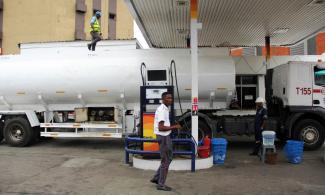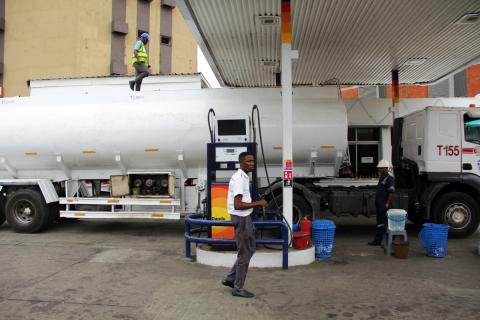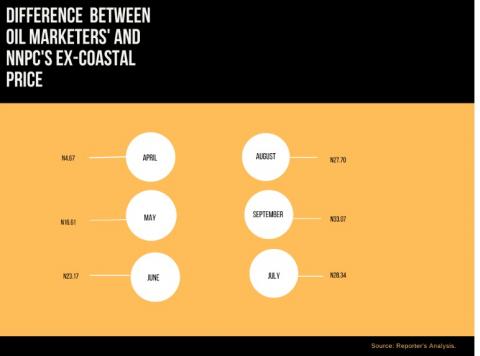
Many would have assumed that the government’s pronouncement of March 18 removed subsidies but players who feel the brunt of the unfair advantage enjoyed by the NNPC in any form know differently.
When Nigeria’s President Muhammadu Buhari backed the Petroleum Product Pricing Regulatory Agency, to perform its statutory duty of regulating the price of gasoline using market parameters, independent importers would have had a renewed hope that their dependence on the state owned NNPC was over. They were wrong.
The dashed expectation resulted from the inability of the independent importers to access forex at the same rate as the NNPC from the Central Bank of Nigeria, a worrying development industry watchers say impedes competition and impacts negatively on the margins of the independent importers.

A technical committee set up by the minister of Labour and employment outside the purview of the PPPRA to address the corporation’s undue advantage in December 2020 submitted its report in February 2021 but the government is still dallying on how to proceed.
The presidency’s policy flips and signals of uncertainty are hitting petrol retailers hard.
“We have been shouting that our business is dwindling and we cannot restock,” says Billy Gillis-Harry, President Petroleum Product Retail Outlet Association of Nigeria. “A lot of retail outlets have eaten into their capital due to losses and we are asking the government to halt these trend by fully deregulating the market.” Gillis-harry was speaking on March 12, when the minister of state for petroleum resources described a modulated price advised by the PPPRA as ‘misinformation.’
If any marketer dared to import petrol in April last year, they would have done so at an assumed N8.23bn more than it would cost the NNPC, thanks to a forex difference of N60.15.

Between April and September, the last month the corporation released its monthly financial and operational report, the former is the month when PPMC imported its highest volume of petrol – 1.81bn liters. This comes down to an average of about 60m liters per day. Considering that the Seme border was supposed to have been closed at this time, this volume of importation is higher than the N50m average the corporation says Nigeria consumed prior to the border closure.
The importation made in May was the lowest of the period. Since the country was on lock down in April, the daily importation of 16m liters comes as no surprise.
August was the month when the NNPC’s advantage over an oil marketer, who attempted to import the same volume of product, was most pronounced in terms of Ex-coastal price – the sum of the cost of purchasing and shipping refined products.

With an ex-coastal price for the NNPC at N113.70 calculated based on a forex exchange rate of N360 to the greenback, an oil marketer would have set his/her own ex-coastal price at N146.77, no thanks to a forex rate of N464.71. This gives the NNPC a healthy advantage of N33.07.
In terms of total volume of production, September was the month when the NNPC’s forex favour was most prominent. Based on an import of 1.58bn liters of PMS, an ex-coastal price of N113.70, a dollar exchange rate of N379 offered to the NNPC and an exchange rate of N473.48 sourced by an oil marketer from a Bureau de Change operator, it would have cost a daring trader N44.75bn more to import the same volume of refined gasoline.

Despite the PPPRA’s constitutional right to fix PMS prices based on market forces, the agency did so only thrice in April, June and July. The Petroleum Products Marketing Company, a subsidiary of the NNPC whom the PPPRA ought to be regulating, released memos to oil marketers for all months in view, telling them the price at which it brought the product to the depot.
“The agency shall monitor market trends and periodically advise the NNPC and oil marketing companies on market-based price,” the first clause of the third section of a gazette approved by the president empowering the PPPRA to regulate prices based on market forces read. Statements from government officials defined ‘periodically’ as used in the PPPRA gazette to mean monthly.
Only the PPMC’s ex-coastal price for March – 99.44 and August – 113.70 was found in media reports. The assumed cost of the corporation’s forex advantage was consequently captured using these two ex-coastal prices. The lower of the two ex-coastal prices was used to represent figures for March, April and May, when the cost of a barrel of Brent crude was less than $29.

Many would have assumed that the government’s pronouncement of March 18 removed subsidies but players who feel the brunt of the unfair advantage enjoyed by the NNPC in any form know differently.
National Operation Controller of the Independent Petrol Marketers Association of Nigeria (IPMAN), Michael Osatuyi, is confused by the signals coming from the presidency and wonders why the NNPC is allowed to continue reducing its remittance to the federation account at the expense of everyday Nigerians trying to make a living from the downstream sector of the oil and gas industry.
“Today, they put a price band, tomorrow they delete from their website,” he said in an interview on March 12. “What is clear now is that there is subsidy. PPPRA says fuel is N212, NNPC says it is N162 to N165. Who is paying the difference? It is the government. The NNPC is collecting this from our federation account. Is the government an NGO or a civil society?”
Gillis-Harry is , however, concerned by the low retail margin of N6.19 afforded to retailers. He says it does not give room for the retail end of the oil and gas industry to innovate.
“Retail outlet owners are the one bearing the brunt of this brouhaha. Regulatory authorities cannot sit down and do an arm chair economics of this business, they need to input experience from the grassroots into their regulation,” he say. “Anything that does not involve data, speculation comes in. The minimum margin that we have proposed on any occasion is N14.”
The NNPC has claimed often that it provides some form of forex relief to oil marketers in conjunction with the Central Bank. Its former Chief Operating Officer downstream, Henry Ikem-Obih, said in 2019 that the corporation had saved $1.7bn from a forex intervention scheme launched in conjunction with the apex bank for oil marketers. In a statement published in September 2020, the spokesperson for the NNPC, Kennie Obateru, quoted the Group Managing Director of the oil company, Mele Kyari, as saying that the corporation had spent N2.13tn on forex subsidies for oil marketers between 2016 and 2019.
Mr. Obateru has so far declined to comment, directing this reporter to the Central Bank instead.
Media advocacy organisation, Civic Media Lab, sent a Freedom of Information request in 2019, asking the central bank to clarify the statements made by the NNPC official and state what companies receive priority forex rates if any. The firm received no response.
The Nigerian government is undoubtedly in a tug of war between trying to get subsidies off its hands and keeping whatever percentage of popularity it has. Hikes in the price of bread and gasoline after all, have been the downfall of regimes in Sudan and Algeria.
Media reports and comment by experts in 2018 suggest that President Emmanuel Macron’s green tax, which inflated the price of petrol in France, is one of the flares that sparked the Yellow Vest movement into life. Those demonstrations lasted for over a year and spread to neighbouring Belgium. Observers say fears like these and constant reminders from organised labour appears to inspire the Presidency to continue passing the buck like its predecessors did to it. Will the government learn a lesson that time is running out and the world is evolving past PMS?
This story was produced under the NAREP oil and gas 2021 fellowship of the Premium Times Centre for Investigative Journalism.